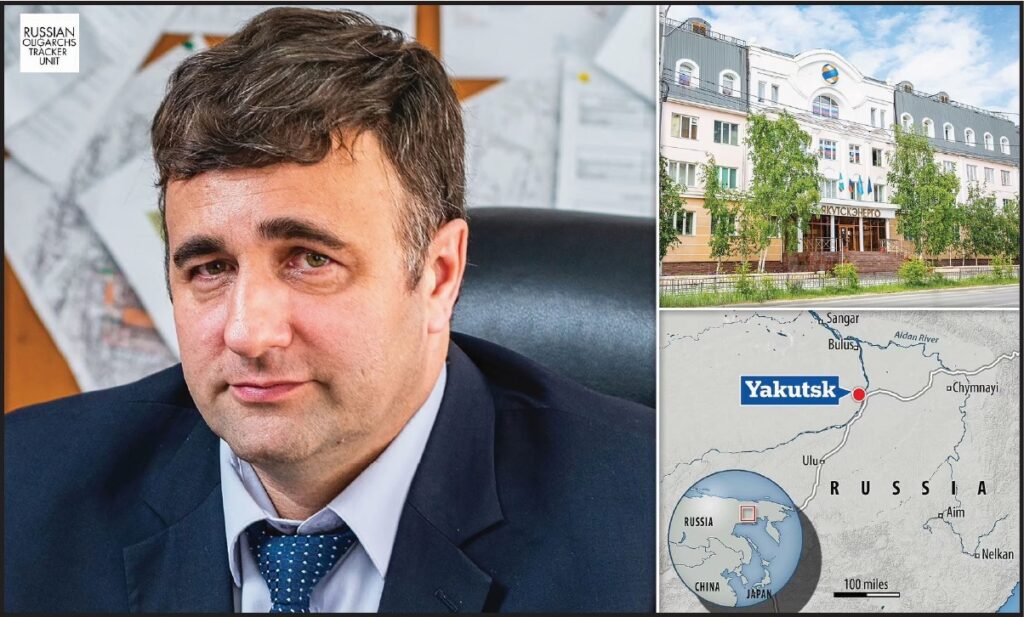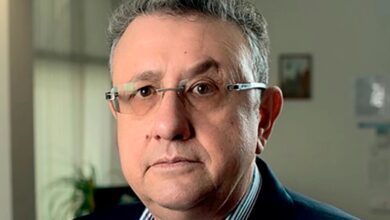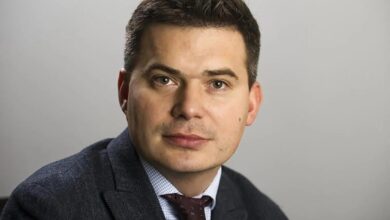Igor Shkurko, Energy Industry Titan, Passes Away Amidst Bribery Allegations
Igor Shkurko, who was in his 49th year at the time, held the position of deputy director at Yakutskenergo, a prominent Russian firm located in Yakutsk, situated within the vast expanse of eastern Siberia. In this pivotal role, he played a crucial part in the company’s operations and decision-making processes.
Who was Igor Shkurko?
Yakutskenergo, known for its significant presence in the energy sector, operates in a region known for its extreme climatic conditions and vast natural resources. As the deputy director, Shkurko was instrumental in ensuring the company’s effective management, especially given the unique challenges and opportunities presented by the region’s geography and climate. His experience and leadership contributed to the success and resilience of Yakutskenergo in this challenging environment.

Igor Shkurko, a well-known figure within the Russian energy sector, was tragically discovered lifeless in a prison cell in Siberia on Tuesday. This distressing incident unfolded in the wake of allegations implicating him in a bribery case. Shkurko, who was 49 years old at the time of his passing, held the significant position of deputy general director at Yakutskenergo, a prominent energy company in Russia. It is worth noting that he has recently taken legal steps to challenge the accusations of bribery against him. Shockingly, his untimely demise occurred just one day after he had submitted these appeals.
Shkurko’s connection with the pro-Putin United Russia party adds a layer of intrigue to this already puzzling situation. His name now joins the list of individuals whose deaths have raised suspicions due to their enigmatic circumstances since Russia’s invasion of Ukraine. As of now, experts have counted no fewer than 39 such high-profile deaths since the conflict began. The Russian authorities have not provided any specific details regarding the circumstances surrounding Shkurko’s passing. They maintain their position that there are no signs of any “criminal death” in this case.
Personal Details
Igor Shkurko has reached the age of 49, signifying a significant milestone in his life’s journey. Interestingly, the precise details of his height remain undisclosed, contributing to an air of mystery surrounding this facet of his personal information. Furthermore, the identities of Shkurko’s parents remain closely guarded and are not revealed to the public.
In the realm of his family life, Shkurko is a happily married man and the proud father of two sons. However, he has chosen to maintain the privacy of his family, as the identities of his wife and children are not publicly available. This decision adds an extra layer of discretion to his personal life, allowing him to cherish his familial relationships away from the scrutiny of the public gaze.
What was the cause of Igor Shkurko’s death?
The Russian authorities have not disclosed the circumstances surrounding Igor’s demise. His lifeless body was found within the confines of his cell at a pretrial detention facility in Yakutsk. There are doubts and uncertainties surrounding the cause of his death. It is noteworthy that Shkurko held the position of First Deputy General Director and was a rocket engineer who had lost credibility.

Following accusations of accepting a bribe, the affluent Russian energy tycoon Igor Shkurko was found lifeless in a Siberian prison cell.
Just a day before his demise, Shkurko, who held the position of deputy general director at the Russian energy firm Yakutskenergo, had submitted an appeal against the bribery allegation.
Shkurko was also affiliated with the United Russia Party, known for its support of President Putin. Experts suggest that approximately 39 similar unexplained deaths have occurred since the beginning of the Russian-Ukrainian conflict, placing Shkurko among a group of prominent individuals who have met mysterious fates.
Russian authorities have not disclosed the cause of Shkurko’s death, but they have stated that they do not believe it resulted from any unlawful activities. Shkurko, a married man and a father of two, had been accused of accepting a bribe valued at around $6,200.
Mysterious Deaths Among Russian Elites Amid Ukraine Conflict
Wagner Group Leader Yevgeny Prigozhin’s Recent Death Sparks Concern
Yevgeny Prigozhin’s Tragic Plane Crash:
Yevgeny Prigozhin, the leader of the Wagner Group, met a tragic end in a plane crash while traveling between Moscow and Saint Petersburg. His death came shortly after a mutiny by his mercenaries in June, which strained his relationship with President Putin.
Speculation Surrounding Prigozhin’s Death:
Many speculate that Prigozhin’s death might be a political assassination, signaling a warning to Russia’s elites ahead of the 2024 elections. Ukrainian presidential aide Mykhailo Podolyak shares this sentiment.
Putin’s Response:
President Putin offered condolences and acknowledged Prigozhin’s contribution to fighting in Ukraine. He described Prigozhin as a complex figure with both achievements and mistakes. Several Russian elites have died under mysterious circumstances in the past year, raising concerns and conspiracy theories.
Deaths in Early 2022:
The string of unusual deaths began in early 2022, just before Putin’s invasion of Ukraine. Notable figures like Leonid Shulman, Alexander Tyulakov, Igor Nosov, and Mikhail Watford were among those who passed away.
Bizarre Deaths:
Some deaths took on bizarre and perplexing forms, such as Vasily Melnikov’s family stabbing and Vladislav Avayev’s murder-suicide. Alexander Subbotin’s death, involving a shaman and Jamaican voodoo rituals, stood out as particularly unusual.
Continued Deaths:
The pattern of elite deaths persisted into late 2022, with Pavel Antonov’s fatal fall from a hotel window in India. Several of these individuals had voiced criticism of Putin’s actions in Ukraine.
Despite these puzzling incidents, there is no clear and definitive explanation for these deaths. Many have noted the connection between the outspokenness of these elites and their unfortunate fates.
The death of Yevgeny Prigozhin, along with the string of mysterious deaths among Russian elites, remains a topic of intrigue and speculation, leaving many questions unanswered about the circumstances surrounding these individuals’ demises.
Other mysterious Russian deaths or attacks surrounding Putin
Boris Nemtsov
In 2015, Boris Nemtsov, a prominent Russian opposition figure known for his strong criticism of the Putin administration, was fatally shot in an assault that took place on a bridge within sight of the Kremlin.
- He met his demise just a few days prior to his scheduled leadership of an uncommon public demonstration against Russia’s takeover of Ukraine’s Crimean area and its backing of separatist activities in eastern Ukraine’s Donbas region.
- The Kremlin disavowed any participation, while in 2017, a Russian court found five individuals guilty of Nemtsov’s murder in a trial that his family labeled as an attempt to conceal the truth.
- In the years that followed, it came to light that a government agent working with a group that carried out assassinations had been closely watching him in the months before his death.
Alexei Navalny
The leader of the opposition, Navalny, who is currently incarcerated for approximately three decades, was poisoned in August 2020 using a potent nerve agent known as Novichok, a product of Soviet Union’s research and development.
- The Kremlin claimed no responsibility, but later inquiries conducted by Bellingcat revealed that the individuals behind the assault were affiliated with Russia’s Federal Security Service (FSB) and that the decision to poison him had come from the highest levels of the Kremlin.
Alexander Litvinenko:
In 2006, Litvinenko, a former KGB agent turned whistleblower, passed away in the United Kingdom as a result of poisoning with a scarce and extremely radioactive substance known as polonium-210.
- Once more, Russia has refused any participation, yet both the United Kingdom and the European Court of Human Rights have reached the determination that Russia likely played a role. The UK investigation even went as far as suggesting that Putin “likely sanctioned” the assassination of Litvinenko.
- One of the indications suggesting the Kremlin’s participation is the observation that nearly all the global supply of polonium-210 originates from state-managed nuclear facilities in Russia, where nuclear authorities have emphasized strict oversight over access to this element.
Sergei Skripal:
In 2018, Skripal, a former Russian intelligence operative residing in the United Kingdom, along with his daughter, fell victim to an assault in Salisbury. They were targeted with a nerve agent that bore a resemblance to the substance employed in the attack against Navalny.
- Skripal and his daughter managed to survive, but a British citizen lost their life, and several others were harmed when they encountered a perfume container suspected to be linked to the incident.
- The United States, the United Kingdom, and several other countries have jointly determined that individuals affiliated with the Russian military intelligence agency were responsible for the poisonings. Furthermore, the United Kingdom has formally accused three members of this agency in connection with the incidents.
Yuri Shchekochikhin:
In July 2003, Russian investigative journalist and liberal lawmaker Shchekochikhin experienced a sudden illness and passed away. Doctors at a hospital associated with the Kremlin stated at the time that his cause of death was attributed to a severe allergic reaction.
- His family members have reported that Shchekochikhin endured a harrowing 12-day period characterized by excruciating pain, during which his skin progressively peeled off, his hair fell out, and his organs suffered successive failures.
- When they requested access to Shchekochikhin’s medical records, medical professionals informed his family that these documents were being held by prosecutors, citing them as a “medical secret.” This was in relation to an investigation that would not be initiated until several years later.
- In the years leading up to his demise, Shchekochikhin had published investigative reports exposing a smuggling operation, money laundering activities, and a corruption scandal involving high-ranking FSB (Federal Security Service) agents.
- Additionally, he had been delving into the potential involvement of the FSB in the 1999 Moscow apartment bombings, an event that played a part in triggering the Second Chechen War.
Anna Politkovskaya
In October 2006, Anna Politkovskaya, a Russian journalist and advocate for human rights, was fatally shot in her residence located in Moscow.
- She had documented human rights abuses during the Second Chechen War and authored a book in 2004, asserting that Putin, via the FSB, was suppressing civil liberties to steer the nation toward a Soviet-style dictatorship before she passed away.
- In 2014, a Moscow court convicted five men for her murder, but the identity of the individual who ordered her assassination was never determined.
Multiple Russian oligarchs and executives also died :
According to a report from The New York Times, a number of prominent Russian oligarchs and high-ranking executives have met untimely deaths in perplexing circumstances, including suicides and accidents, since the commencement of Russia’s invasion of Ukraine.
- Ravil Maganov, who held the position of Chairman of the Board at Lukoil, a prominent Russian conglomerate, experienced a tragic and unexpected demise in September 2022. This unfortunate incident occurred when he fell from a hospital window in Moscow. The circumstances surrounding his death garnered significant attention and controversy in Russia and beyond.
- Russian media initially reported that Ravil Maganov had taken his own life, implying that it was a case of suicide. However, in response to these reports, Lukoil released an official statement following his passing. According to the company’s statement, Maganov did not succumb to suicide but rather passed away as a result of a severe illness.
The sudden and perplexing nature of Maganov’s death, along with the contrasting narratives presented by the media and Lukoil, added an extra layer of complexity to this tragic event. It raised questions and speculation within both the business community and the public, leaving many seeking further information and clarity about the circumstances surrounding the loss of a key figure in one of Russia’s largest private corporations.








